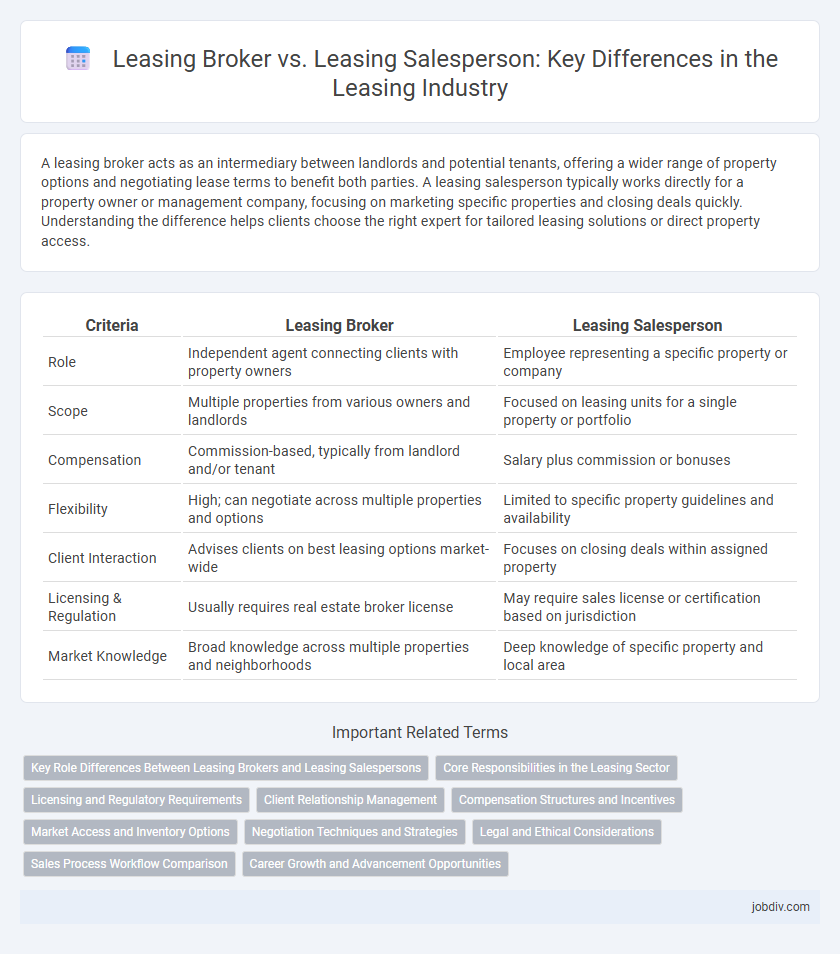A leasing broker acts as an intermediary between landlords and potential tenants, offering a wider range of property options and negotiating lease terms to benefit both parties. A leasing salesperson typically works directly for a property owner or management company, focusing on marketing specific properties and closing deals quickly. Understanding the difference helps clients choose the right expert for tailored leasing solutions or direct property access.
Table of Comparison
| Criteria | Leasing Broker | Leasing Salesperson |
|---|---|---|
| Role | Independent agent connecting clients with property owners | Employee representing a specific property or company |
| Scope | Multiple properties from various owners and landlords | Focused on leasing units for a single property or portfolio |
| Compensation | Commission-based, typically from landlord and/or tenant | Salary plus commission or bonuses |
| Flexibility | High; can negotiate across multiple properties and options | Limited to specific property guidelines and availability |
| Client Interaction | Advises clients on best leasing options market-wide | Focuses on closing deals within assigned property |
| Licensing & Regulation | Usually requires real estate broker license | May require sales license or certification based on jurisdiction |
| Market Knowledge | Broad knowledge across multiple properties and neighborhoods | Deep knowledge of specific property and local area |
Key Role Differences Between Leasing Brokers and Leasing Salespersons
Leasing brokers act as intermediaries connecting tenants with property owners, leveraging market knowledge to negotiate favorable lease terms and offering a broader range of property options. Leasing salespersons primarily represent specific landlords or property management companies, focusing on marketing and securing leases for designated properties. Brokers typically have access to multiple listings and provide advisory services, while salespersons concentrate on filling vacancies for their clients.
Core Responsibilities in the Leasing Sector
Leasing brokers facilitate tenant-landlord agreements by sourcing properties, negotiating lease terms, and advising clients on market conditions, ensuring optimal lease arrangements. Leasing salespersons focus on marketing available properties, conducting property tours, and closing lease deals directly with prospective tenants to meet sales targets. Both roles require strong knowledge of lease contracts and local market trends but differ in client interaction scope and transactional responsibilities.
Licensing and Regulatory Requirements
Leasing brokers must obtain specific licenses, such as a real estate or leasing broker license, to operate legally and often face stricter regulatory oversight compared to leasing salespersons. Leasing salespersons typically work under the supervision of a licensed broker and may require a salesperson's license or registration, depending on state or local regulations. Compliance with continuing education and adherence to fair housing laws are mandatory for both roles to ensure ethical leasing practices.
Client Relationship Management
Leasing brokers excel in client relationship management by offering personalized leasing solutions tailored to diverse client needs, often maintaining ongoing communication to build long-term trust. Leasing salespersons primarily focus on closing individual deals, with less emphasis on nurturing sustained client relationships beyond the sales process. Effective client relationship management in leasing enhances customer retention and drives repeat business, making the broker role vital for long-term success in the leasing industry.
Compensation Structures and Incentives
Leasing brokers typically earn commissions based on a percentage of the lease value, incentivizing them to close higher-value contracts and represent multiple landlords or properties. Leasing salespersons often receive a base salary supplemented by bonuses or commissions tied to individual lease deals, motivating consistent performance within a specific company or property portfolio. Both compensation structures align incentives with closing deals, but brokers benefit from broader market opportunities while salespersons gain stability and targeted rewards.
Market Access and Inventory Options
Leasing brokers provide extensive market access by partnering with multiple dealerships and financial institutions, offering clients a broader range of inventory options across various brands and models. Leasing salespersons typically represent a single dealership, limiting their inventory to specific manufacturer lines and available stock on-site. Clients seeking diverse leasing opportunities benefit from brokers' wider market reach and flexible vehicle selection.
Negotiation Techniques and Strategies
Leasing brokers leverage extensive market knowledge and third-party relationships to negotiate favorable lease terms, often securing better pricing and flexible contract conditions for clients. Leasing salespersons focus on direct interactions with property owners, utilizing personalized negotiation techniques to close deals efficiently and meet sales targets. Effective leasing negotiation strategies include understanding client needs, analyzing market trends, and employing persuasive communication to optimize lease agreements.
Legal and Ethical Considerations
Leasing brokers and leasing salespersons both facilitate lease agreements, but brokers typically operate with a fiduciary duty to represent the lessee's best interests, requiring strict adherence to legal disclosures and conflict-of-interest avoidance. Leasing salespersons often work directly for lessors, with ethical obligations centered on transparent communication and fair dealing to comply with consumer protection laws. Both roles must navigate licensing requirements, anti-fraud regulations, and ensure compliance with relevant leasing statutes to maintain professional integrity and legal accountability.
Sales Process Workflow Comparison
Leasing brokers typically manage client inquiries, negotiate lease terms with multiple property owners, and coordinate contract finalization, offering a broader market reach. Leasing salespersons often handle direct property showings, client qualification, and immediate lease signing at a single property or agency. The sales process workflow of brokers emphasizes multi-party negotiations and market analysis, while salespersons focus on personalized client interaction and swift transaction completion.
Career Growth and Advancement Opportunities
Leasing brokers typically have greater career growth potential due to their ability to work independently, manage multiple clients, and earn higher commissions through networking and negotiation skills. Leasing salespersons often start with entry-level roles focused on direct property leasing and can advance by gaining experience, but their progression is generally limited within a single company or property management firm. Brokers benefit from broader market knowledge and entrepreneurial opportunities that facilitate long-term career advancement in commercial and residential real estate sectors.
Leasing Broker vs Leasing Salesperson Infographic

 jobdiv.com
jobdiv.com